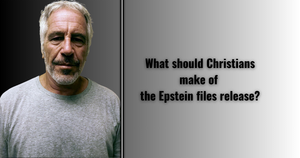Several high-profile American cases have elicited widespread debates over the concept of the death penalty. Most notably, Charlie Kirk assassin Tyler Robinson will be tried in a state (Utah) that utilizes capital punishment. Does the Bible give credence to the practice?
In the United States, serious violent crime has been punished differently throughout the history of the nation. It has also been punished differently by state.
The death penalty was once a much more common legal punishment in this country, but since the 1972 Supreme Court decision Furman v. Georgia put a temporary stop to capital punishment, the number of criminals executed in the US has decreased.
Even so, there have been 1637 people executed in the United States since 1976.
With multiple high-profile cases happening now or in the near future, the discussion around the death penalty has picked up again. The most public of these trials hasn't even begun yet. Utah Governor Spencer Cox said that his state will pursue the death penalty for Tyler Robinson, the assassin responsible for the September 10th shooting death of political pundit Charlie Kirk.
There is disagreement all around the country regarding the moral standing of capital punishment. For Christians, though, the question remains: "What does the Bible have to say about the death penalty?"
This article will present some facts and observations about capital punishment in the United States, examine what the political Left and political Right in America believe, and then dive into God's Word to see what Scripture teaches on the subject.
Some facts about the death penalty
- At the time of this writing, there are 23 states that outlaw capital punishment. The District of Columbia (Washington DC) also outlaws the practice. Of the 27 remaining states, four have pauses in place, leaving 23 states that currently practice the death penalty. The federal government may also exercise capital punishment.
- According to the Department of Justice, "the death penalty can only be imposed on defendants convicted of capital offenses – such as murder, treason, genocide, or the killing or kidnapping of a Congressman, the President, or a Supreme Court justice." Other crimes can be considered for capital punishment, such as espionage, large-scale drug trafficking, attempted murder to obstruct a drug kingpin investigation, and certain sexual abuse/assault crimes that result in death, even if murder wouldn't have been the original charge.
- A jury must deliberate and then unanimously decide that capital punishment is the appropriate sentence for a violent criminal. It is not a guaranteed result in any case.
- Minors, pregnant women (because of their babies), those with mental disabilities, and those determined to be unfit for trial are not eligible for the death penalty, no matter their crimes.
- Since 1976 (when a temporary national pause on capital punishment ended), 1637 people have been executed in the United States. That averages to fewer than one person per state per year.
Some observations about the death penalty
- The death penalty was once much more commonly applied to violent crime than it is today. European practices of execution by hanging, burning at the stake, and beheading by guillotine were brought over to the "New Land."
- Many of the early executions in America stemmed from violations of the biblical 10 Commandments.
- Politically speaking, modern capital punishment is much more supported in conservative states than liberal ones.
- Most who favor the use of the death penalty due so, in part, in hopes that it will be a deterrent to crime. However, statistics are murky (at best) as to whether or not that is the case.
- Arson, rape, counterfeiting, and piracy were once capital offenses punishable by death. Now, none of those crimes alone make one eligible for the death penalty.
What the Left says about the death penalty
Though not a unanimous party line, capital punishment is largely opposed by the political Left in America. Democrats have been some of the leading voices fighting against the death penalty, and democratic states make up the majority of the list that have outlawed the practice at the state level. Typically, those liberals who do not oppose executions in totality do support severe reform.
- Some opponents to capital punishment cite the 8th Amendment and 14th Amendment of the United States Constitution. The 8th Amendment forbids "cruel and unusual punishment," while the 14th Amendment says that no state can "deprive any person of life, liberty, or property, without due process of law."
- Former President Joe Biden contends that the United States must totally stop its use of the death penalty, saying that it is akin to the murders that many of the criminals committed in the first place.
- Former Vice President Kamala Harris argues against capital punishment's morality and cites the irreversible nature of death as her reasoning.
- Other liberal leaders, such as former President Barack Obama and former Presidential candidate Hillary Clinton, do not support the full cessation of executions. However, both prominent Democrats support limiting how often it is applied and support reform to the entire process.
- A vast majority of liberal politicians believe that the United States has used capital punishment in a discriminatory way, arguing that minorities face the death penalty at a disproportionate rate.
- North Carolina Governor Josh Stein recently signed a bill known as "Iryna's Law" in response to the brutal Charlotte subway murder of Ukrainian immigrant Iryna Zarutska by DeCarlos Brown, a serial violent criminal. The new law actually lowers barriers and restrictions against the death penalty in the Tar Heel State.
What the Right says about the death penalty
Republicans are not wholly united on capital punishment policy, just as Democrats are not. However, the majority opinion on the Right is that certain crimes are justifiably punishable by death. Most of the states that still exercise capital punishment are states that typically vote conservatively.
- President Donald Trump says that capital punishment "protects Americans" from the acts of violent criminals and that without the death penalty, the US cannot be a "nation of law and order."
- Former President George W. Bush argued that the death penalty "saves innocent lives," both by acting as a deterrent and by keeping a violent criminal from reoffending.
- Florida Governor Mark Desantis believes that execution is the "only appropriate punishment" for heinous, violent crime.
- Some conservatives oppose the death penalty or support limiting its usage. Former Pennsylvania Senator Rick Santorum was a vocal advocate for reform within the world of capital punishment, and Ohio Representative Jean Schmidt opposes the death penalty altogether and is part of why the state currently has a pause on the practice.
- Others, such as former Presidential candidate Jeb Bush, argue that capital punishment isn't worth the effort, trial cost, and delays in justice.
What the Bible says
The death penalty is clearly commanded in the Bible. However, there has been debate over centuries as to whether or not that command is still active today. Below is what the Lord says in His Word about capital punishment.
First, the concept of the death penalty is not unbiblical.
It is obvious to see the Lord's Old Testament requirements for the death penalty in numerous places in Exodus, Leviticus, and Deuteronomy. However, those are not the first instances of capital punishment commands in the Bible.
Back in Genesis 9:6, as part of His covenant with Noah, the Lord tells Noah, "Whoever sheds the blood of man, by man shall his blood be shed, for God made man in his own image."
Linguistically, this is not a prophetic promise but an imperative command.
The previously mentioned commands from the Torah back up this imperative. Deuteronomy 19:13 even states that Christians "shall not pity" murderers.
However, Numbers 35 mentions the importance of evidence and/or witnesses, signifying the requirement of proof. Even thousands of years ago, the death penalty was not to be used haphazardly.
The concept of a death penalty is not unbiblical, but it does require great discernment.
Though other sins are listed as capital offenses in other parts of the Old Testament, murder is the only one that is part of two separate covenants, the Mosaic Covenant and the Noahic Covenant. The Lord's covenant with Noah was made between God and all mankind, not just Israel, meaning that capital punishment for murder was prescribed as both part of the Mosaic moral law and God's general commands for all of mankind. Because of this, Christ's fulfillment of the Mosaic Covenant's ceremonial law and civil law does not remove the God-given just punishment of execution for murder. In several instances, the Bible seems to indicate that capital punishment is a just sentence for certain sins, not necessarily that the Lord requires it. He clearly required it for murder.
In fact, murder is the only crime that has always been punishable by death ever since the time of Noah. Because the Mosaic law seemingly allows for capital punishment for other sins, it would be just for a government to adopt those same principles. However, only murder appears to hold a consistent biblical command of execution.
Human life is sacred, leading to the debate about how best to value life.
Because all mankind has been made in the image of God (Imago Dei), all human life is sacred and full of value.
Some take that to mean that no human life should ever be taken. In fact, some believe that's what the 9th Commandment states, as some biblical translations render Exodus 20:19 as "Thou shalt not kill." However, the Hebrew word used in the Commandment is better translated as "murder," and the distinction is important.
Prominent 20th-century pastor and theologian RC Sproul argued that because human life is sacred, capital punishment is necessary. He said, "But the moral justification for capital punishment is because God says human life is so important, so sacred, that if somebody else willfully, maliciously goes and murders another human being, they forfeit their right to life." Essentially, he contended that murder is such a heinous offense against God and his chief creation that the Lord deals particularly harshly with it.
Murder is also the most egregious rebellion against God's command to mankind to "be fruitful and multiply," (Genesis 1:28, Genesis 9:1). Not only is it not multiplication (or adding to shift the math metaphor), it is subtraction.
Mercy cannot be ignored in this conversation.
Opponents of the death penalty often mention God's merciful nature as support for their position.
However, while it is certainly true that the Lord is merciful, it is also true that He is just. If the Lord deems murder to be punishable by death, who are we as people to disagree?
As such, God grants earthly government's the authority to "bear the sword" against the wicked. In fact, Paul calls a government exercising that authority a "servant of God," implying that they are doing the Lord's will.
Romans 13:1-4 says, "Let every person be subject to the governing authorities. For there is no authority except from God, and those that exist have been instituted by God. Therefore whoever resists the authorities resists what God has appointed, and those who resist will incur judgment. For rulers are not a terror to good conduct, but to bad. Would you have no fear of the one who is in authority? Then do what is good, and you will receive his approval, for he is God's servant for your good. But if you do wrong, be afraid, for he does not bear the sword in vain. For he is the servant of God, an avenger who carries out God's wrath on the wrongdoer."
It is certainly worth noting, though, that there is room for mercy in some instances. Jesus, Himself, showed mercy to the woman caught in adultery in John 8. In Jewish society, that crime was also punishable by death, but the Messiah was merciful to her. Biblical heros likes Moses, David, and Paul were all guilty of directly or indirectly killing others (though, the label "murder could be argued against in each case). Yet none of them were put to death, and David and Paul were explicitly forgiven.
Speaking of mercy...
The dark reality behind this conversation is this: every sin could be punishable with death. Because of the stark contrast between God's holiness and mankind's sinfulness, every one of us is deserving of death.
Paul says in Romans 6:23, "For the wages of sin is death," and says in Ephesians 2:1-2, "And you were dead in the trespasses and sins in which you once walked."
At the risk of sounding hyperbolic, the Lord would have been perfectly just to end the story of human existence in Genesis 3 with the Fall. Instead, in His grace and mercy, He had a differently plan in mind.
Anything aside from instant death and Hell for all sinners (which means all people) is a merciful act of God.
Final verdict
The death penalty is the most disputed legal punishment in the modern world.
The Bible is clear, though: governments have the right to "bear the sword" against criminals guilty of certain sins. Based on a command from the Noahic Covenant in Genesis 9, governments are even required to exercise this right for murderers. It should be noted, thinking biblically and practically, no one should ever be executed without adequate evidence/eyewitness testimony.
For individual Christians, forgiveness is still always possible, even if the death penalty is also a just punishment from the government. Chris Singleton–whose mother Sharonda Coleman-Singleton was killed in Charleston, South Carolina as part of the Mother Emanuel Massacre–and Erika Kirk–whose husband Charlie Kirk was assassinated this September–both demonstrated this type of forgiveness for murderers. Mother Emanuel killer Dylann Roof is awaiting execution, and Kirk killer Tyler Robinson will go to trial soon, and the death penalty is on the table. Even so, Singleton's forgiveness of Roof and Kirk's forgiveness of Robinson are Christ-honoring.
Human life is sacred, as the Lord has made mankind in His image. Because of that, God takes it very seriously when a person dishonors another's special place in creation. That is why He commands the death penalty for murder, but it also why mankind cannot take that responsibility lightly. Capital punishment is a solemn response to a serious violation of God's image in humanity that highlights His justice and the dignity of His chief creation.




